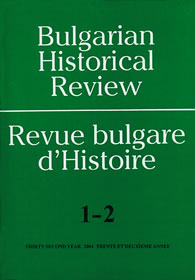Френската дипломация и изборът на губернатор на Източна Румелия (1878-1879 г.)
French Diplomacy and the Choice of Governor for Eastern Rumelia (1878–1879)
Author(s): Hristo GloushkovSubject(s): History
Published by: Институт за исторически изследвания - Българска академия на науките
Summary/Abstract: French diplomatic activity following the Berlin Congress was defined by two primary objectives – immediate implementation of the decisions of the Congress and establishing French Protectorate over Tunisia. Trying to pacify the Balkans, a French delegation lead by Baron De Ring, an experienced and unprejudiced diplomat, was sent from Paris to Eastern Rumelia – first to the Turkish capital, then – to Plovdiv. He was assisted by Baron Coutouglay, later minister plenipotentiary in Bucharest, and the secretary of the French embassy in Constantinople Albin Rose – both of them well-acquainted with the situation in the Balkans. The French documents gathered by the author reveal the diplomatic struggle between the foreign representatives in Plovdiv and Tzarigrad (Constantinople) over the drafting of Eastern Rumelia’s Constitutional Statutes and the choice of its future governor. A description of the tense atmosphere among the local population is given and an emphasis is laid on the unrest among the Bulgarians. The withdrawal of the Russian armies lay ahead. Ring discussed the matter with Bulgarian merchants whom he calls „intellectual elite of the Bulgarian nation in Rumelia“. His advisor Ivan Geshov demonstrated indisputable qualities as a politician and diplomat in the looming events on which the author sheds a new light with a special emphasis on Aleko Bogoridi’s appointment for governor of East Rumelia. Regarding this, Baron de Ring conducted talks with Sultan Abdul Hamid II and his collaborators. The French diplomat’s activity was marked by a degree of democratic attitude and sympathy towards the Bulgarian population in East Rumelia but the French policy was cautious, lacked initiative and alienated itself from tackling Balkan problems. Its anti-Russian orientation prevailed as well.
Journal: Bulgarian Historical Review / Revue Bulgare d'Histoire
- Issue Year: 2006
- Issue No: 1-2
- Page Range: 163-179
- Page Count: 17
- Language: Bulgarian
- Content File-PDF

